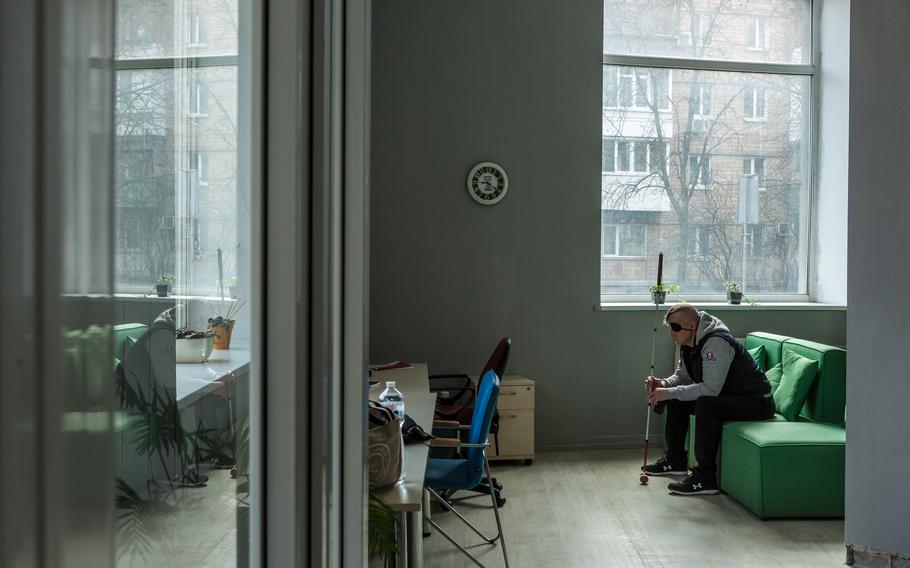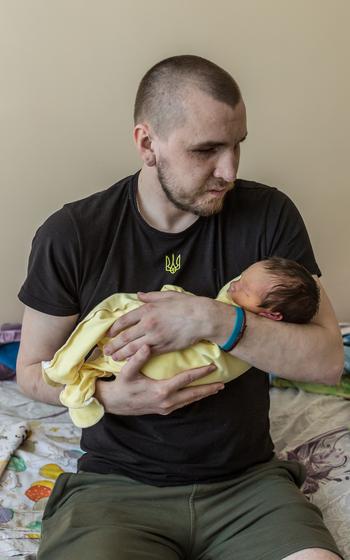Europe
Blinded in battle, these Ukrainian service members will never see their new babies
The Washington Post May 2, 2024

Ruslan Kozachok, 47, a former tattoo artist and a veteran who was blinded by shrapnel on the front line, sits in the Kyiv office of Port, an organization that helps blind veterans and their families adapt after combat. (Oksana Parafeniuk/for The Washington Post)
KYIV — In the 10 months since his daughter was born, Ruslan Kozachok has hardly left her side.
He held baby Isabella in the hospital before his wife did. Lately, he’s learned to keep her steady as she practices her first steps.
But he has never seen her.
Three months before Isabella’s birth, Kozachok, 47, was blinded when shrapnel from a Russian shell pierced the left side of his skull in Chasiv Yar, the small city where he was fighting as a soldier in eastern Ukraine.
Kozachok was once a tattoo artist with his own salon, but his injury has robbed him of his profession, his hobbies, his routine and, most painfully, of the chance to see his daughter grow up.
On the front lines of Russia’s bloody war, Ukrainian troops are killed and wounded daily, scarring and maiming a generation of young people. Many, like Kozachok, voluntarily joined the military in the first days of the invasion in 2022.
Severe eye injuries are pervasive. At least 1,000 soldiers have been blinded in the past two years, said Anna Purtova, a lawmaker who is advocating for soldiers who have lost their vision. Tetiana Lytvynenko, head of ophthalmology at a Kyiv hospital that treats soldiers and civilians, said the 30 beds in her ward are always full.
While medical advances have improved treatment for many war injuries, including with enhanced prosthetic limbs, little can be done for those who lose vision in both eyes and must learn to navigate the world without sight. Ukraine has not yet adapted to its growing blind population. Guide dogs are uncommon, many streetlights do not beep for pedestrians, and drivers often park on city sidewalks, creating dangerous obstacles.
Some wounded Ukrainians are struggling with all of these challenges while also facing parenthood blind.
For nine years before his injury, Kozachok and his wife, Yulia, who works in a bank, dreamed of starting a family. She was six months pregnant when she visited her husband in the hospital and told him what his doctors had explained to her: His vision was gone forever.
Kozachok’s head injury could easily have been fatal. He lost one eye immediately and had to crawl to an evacuation point, where he lost consciousness. He survived but woke up in the hospital to a blur that soon faded into darkness.
For months, he struggled to accept his situation. “It was a daily process of finding the sense in living,” he said. “It’s like fighting with yourself.”
Then Isabella was born. In the hospital, Yulia described Isabella to him: pink skin, red hair and bright blue eyes.
“When she said blue eyes, I just melted,” Kozachok said. He knows that her hair has since turned blonde, and he likes to imagine that, too.
“I can only touch her face and picture her image in my head,” he said. “I’m touching her face a lot.”
Fatherhood, Yulia acknowledged, “is probably what kept him alive.”
Kozachok still hasn’t found a job he can do that satisfies his creative passions. But he has found some solace in rock climbing — a sport he had never tried before losing his vision. Now, he regularly visits a gym in Kyiv.
The owner, who drives him to and from the sessions, calls out directions to help him navigate the rock wall that most climbers scale by following colored patterns.
Kozachok said he is trying to stay healthy and active, for himself - and also for Isabella. “Every father wants to set an example for their kid,” he said.
Denys Abdulin, 35, already had two sons when he left his home in Bila Tserkva, a small city near Kyiv, in March 2022 and joined the military. His wife, Olesia, took their boys to Lithuania for safety.
By April, Abdulin was in the eastern city of Severodonetsk, where Russian forces encircled his brigade, he said. They were hit with artillery, cluster munitions and aviation bombs.
Abdulin took cover in a building. He didn’t hear the drone that spotted them — or the whistle of the mortar that followed. Shrapnel pierced his skull through his left ear and exited his right eye. The soldiers in the building, all wounded, tried to patch each other up while awaiting evacuation.
In a hospital in Dnipro, Abdulin said, he waited days for bandages to be changed. Eventually, he was sent to Kyiv, and Olesia brought their sons, Vadym and David, to visit.
Even though he couldn’t see them, their innocence about his injuries left him hopeful. One was excited to ride in his wheelchair; the other wanted to play with the adjustable hospital bed. “I cannot explain the happiness,” he said.
The boys, now 9 and 6, were two years younger when he last saw them — and that’s how they will stay in his mind.
“I’m very grateful he had a chance to see them,” Olesia said in their living room on a recent Saturday, as their cat, Usik, circled around their legs and the boys ran around with toys. “Their eye color, body types, features. He saw them in real life.”
The boys struggle to understand their dad’s blindness. The younger one, David, once took one of Abdulin’s prosthetic blue eyes and attached it to the head of his red Play-Doh octopus. They bring Abdulin books to read and pictures to see. Sometimes, when they ask him to assemble a toy, he gets frustrated. He wishes he could teach them to box, his favorite sport.
“We didn’t explain the whole situation,” Olesia said. “We tell them he got injured at war.”
Abdulin used to work in a warehouse — a job he can no longer do. Last year, he trained as a massage therapist with help from Port, an organization founded by Purtova, the lawmaker who helps blind veterans adapt. For now, Abdulin borrows a space to serve his few clients, but hopes to open his own studio.
Before hearing about massage school, he said, “I had no idea what a blind person could do.”
His work has given him an important sense of purpose after a difficult recovery. Olesia used to comfort him through panic attacks about his blindness. He also suffered from nightmares. Even good dreams “always have a bad ending,” he said, because he wakes up blind.
He recently had surgery to prepare for eye implants that will help prevent infections and give the appearance of natural eyes — but he still holds out hope that he will see again. “I don’t want to live my whole life blind,” he said.
Ivan Soroka, 27, and his wife Vladyslava, 26, met online in April 2022. At military positions outside Kyiv, he climbed trees to find a signal to message her. They finally met in person and “I fell in love with her green eyes immediately,” he said. By May, they were engaged. When he left for the front in June, “I promised her I’d come back,” he said.

Ivan Soroka, a Ukrainian veteran who lost sight in both eyes because of combat injuries, on Monday, April 29, 2024, holds his newborn son Sviatoslav, born three days earlier. (Oksana Parafeniuk/for The Washington Post)
In August of that year, while Soroka’s unit was retreating from near Bakhmut, a mortar exploded between him and his close friend, Yura, who died, leaving behind a wife and two children. Soroka was badly wounded in his face and legs. He lost sight in both eyes.
His biggest fear, he said, was that he would be a burden to Vladyslava. The biggest surprise, he added, was that she told him they would overcome their challenges together. They married last September. Last month, between air raid sirens in Kyiv, Vladyslava gave birth to a boy — the first time her doctor delivered a baby for a blind parent. The doctor handed Soroka the scissors and he cut the umbilical cord.
They named the dark-haired baby Sviatoslav.
Three days later, family and friends — including some of Soroka’s fellow soldiers — arrived to congratulate the new parents before they returned home. Soroka carefully held his son, cradling his head in the same hands that once held a gun.
“It’s scary to hold baby in your hands,” he said. “If you can see, it might not be so scary. But if you can’t see him. … Such little hands, little legs.”
It was especially good news that he was a boy, the visitors said. Sviatoslav looks like his father. And Ukraine is running out of men.
Oksana Parafeniuk contributed to this report.